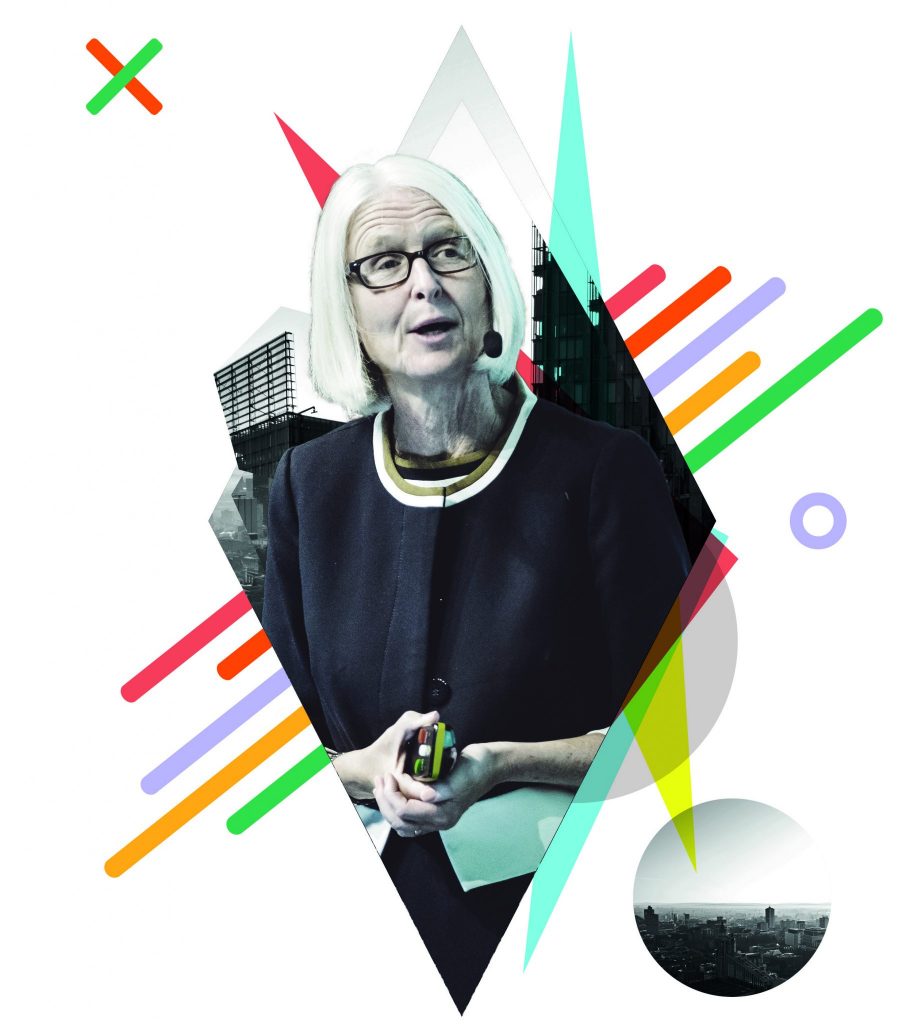You must login/create an account to view this content
The view from Russia
You must login/create an account to view this content
Cultivating diversity to open opportunities
Bringing a glocal approach to the Netherlands
To add value to the local region while promoting internationalisation, Wittenborg University of Applied Sciences takes a ‘glocal’ approach
‘We strive to bring expertise, knowledge and diversity to the local region in which we operate, thereby enhancing the economy, culture and social environment around the university,’ explains Peter Birdsall, President of the Board at Wittenborg University of Applied Sciences in Apeldoorn, Netherlands.
In this interview, Birdsall goes on to outline the School’s plans for the future, while expressing his enthusiasm for two new MBA specialisations on offer at Wittenborg, in AI and clean technology. ‘The employability of these graduates in the Netherlands looks very promising,’ he says. Read on to learn more about the School’s outlook and strategic vision.
Please can you tell me a little about the programmes available at your School, as well as typical student intake sizes?
Our School is based in the Dutch town of Apeldoorn and we currently offer bachelor’s and master’s programmes to around 1,000 students a year (as of 2019) from the Netherlands and around the world. Around 100 of those students are studying entrepreneurship and an MBA in international management at our Amsterdam campus.

We are a continuously developing institute that enjoys bringing a global outlook to a local region. We are growing by an average of 17% a year and aim to achieve around 1,500 students by 2023.
What do you think makes your portfolio of programmes stand out from others that are available in the country headquarters of your School and the surrounding region?
What makes Wittenborg special is its international character. Our students represent over 100 different nationalities and our 120 academics and 60 support staff represent over 40 different nationality backgrounds. It’s a wonderful and dynamic atmosphere to work and study in and the internationalisation and diversity that Wittenborg brings to the municipality of Apeldoorn is clearly appreciated. We embrace internationalisation as a key value and aim to let this be shown in every aspect of life at the School.
To achieve this, we engage in close dialogue with industry, government (local, regional and national) and NGOs, creating a so-called ‘triple helix’. We strive to bring expertise, knowledge and diversity to the local region in which we operate, thereby enhancing the economy, culture and social environment around the university. We call it a ‘glocal’ approach.
How is the School working to boost the employment prospects of its graduates?
All of our programmes contain an element of work experience. In the bachelor’s programmes, this ranges from three to six months depending on the pathway. While work experience is optional in the master’s programmes, modules such as ‘professional enquiry’ and ‘project weeks’ are all carried out in combination with an investigation into practice in the work field.
We encourage all students to centre their final project and graduation assignment on a company or organisation. We find that bachelor’s students often stay at their work placement company to continue with their research project, while master’s students often find work during their graduation phase and base their project on that employer.
Employability of graduates will become an ever-increasing important factor in all audits and measurements of our success in the future and we intend to extend the quality system to encompass assurance of learning by further involving graduates and employers in the development of learning outcomes.
Which single new programme course or initiative are you most excited about and why?
Our MBA is currently available across nine different pathways, and we are extremely excited about the development of two new MBAs with technology specialisations, focussed on AI and clean technology. The employability of these graduates in the Netherlands looks very promising and we have developed these specialisations together with regional employers, and other educators in the area.
Outline the importance of diversity and ethics to your Business School’s strategy and why you feel they are vital topics for business as a whole today

Wittenborg embraces diversity as a key value. It is extremely important to us to promote total equality of students and staff, of cultures, gender, and people with disabilities within the School and also within our environment. We promote a working environment that is fair, and emphasises respect between and within our student and staff body.
Wittenborg’s motto [‘better yourself, better our world’] expresses the commitment to offer higher education where students and staff understand that ethics plays a central role in their every decision. Guided by well-established ethical and moral standards, such as honesty and integrity, we strive for a better tomorrow.
What are your hopes for the School’s future?
Wittenborg University of Applied Sciences’s goal is to develop into a broad business and management-orientated university of applied sciences in various professional fields, such as business and entrepreneurship, hospitality and tourism, arts and technology, health and social care, and education.
As we are a non-profit School, we are able to plough all extra revenues back into the organisation, to support education development and the development of staff. For instance, we currently have 39% of our academics holding a doctorate or PhD. Our aim is to reach 60% of academic teaching staff holding a PhD equivalent qualification, and 40% being scholarly active, by 2021.
The aim to increase our proportion of scholarly-active teaching staff is one of our seven strategic initiatives. These strategic initiatives also include the further development of staff as well as maintaining and managing the current growth strategy, which means ensuring that the quality of incoming students is more important than the quantity and that we continue to improve and enhance our international classroom.
Last year, we started offering split-site PhD programmes in business and management, hospitality and tourism, together with our UK partner, the University of Brighton. This will help us develop our ‘own’ research environment and prepare us well to offer our own doctorate degrees.
What are some of the biggest challenges facing providers of business education in the country headquarters of your School and the surrounding region, in your opinion?
We are a private university of applied sciences, and the only one that is fully English speaking and has such a diverse and international student and staff body. Many of the private Business Schools in the Netherlands are smaller than Wittenborg, and struggle to gain recognition, nationally and internationally.
Is there anything you’d like to see change among providers of business education, or that they could be doing better? (in the country headquarters of your School and/or throughout the rest of the world)
In the Netherlands, there are so many publicly funded business degree programmes taught in English (with Dutch speakers often teaching Dutch speakers in English) that it would be nice to see some regulation of these, as Dutch Minister of Education, Ingrid van Engelshoven, has indicated. Business Schools should focus on excellence within their own particular environment and try to establish a particular outstanding profile, rather than trying to ‘be like the rest’.
Peter Birdsall is President of the Board of Wittenborg University of Applied Sciences in Apeldoorn, Netherlands. He was previously reponsible for internationalising the curriculum at the Saxion University of Applied Sciences in Enschede, Netherlands. He holds a bachelor’s in teaching from Windesheim University of Applied Sciences and a master’s in education management from the UK’s Open University.
Recognising the value of management education in the Czech Republic
Students of MBA and related programmes would greatly benefit from greater recognition from the Czech Republic’s Ministry of Education, as would providers of post-graduate management education, says Ivo Ducheček, Director of Prague’s Business Institut EDU. ‘A change in the legislation would be a welcome step,’ he says.
For Ducheček, the value provided by Business Institut’s BBA, MBA and DBA programmes, both in-person and online, is clear from the employability of its participants. ‘There is literally a “battle” for our graduates,’ Ducheček says.
As well as discussing the need to adapt to students’ learning preferences and the need for continual improvement, Business Institut’s Director also outlines the School’s plans to maximise the benefits of the latest teaching technology and to expand internationally in this interview with Business Impact Content Editor, Tim Dhoul.
What are some of the biggest challenges facing providers of business education in the Czech Republic and the surrounding region, in your opinion?
Maintain students’ interest. Many students decide [where to study] on the basis of positive references, so it is important to direct attention not only to new students, but also to current students.

It is equally important to keep the quality and professionalism of the education provided. The biggest challenge is to continually improve, move forward and always provide a little more than the competition.
Is there anything you’d like to see change among providers of management education in the Czech Republic?
A change in the legislation would be a welcome step. Post-graduate management education is, in my opinion, as important as university education. Yet, in the Czech Republic, it is not recognised by the highest body, the Ministry of Education, as it is in other countries. Such a change would certainly be positive, not only for quality schools, but for MBA students themselves.
How is Business Institut working to boost the employment prospects of its graduates?
We regularly cooperate with the best headhunters and high positions are filled by our students or graduates. Overall, our form of teaching is built to be highly practical, so there is literally a ‘battle’ for our graduates in the job market. We regularly carry out research in this area, and this suggests that 98% of Business Institut’s graduates advance their careers immediately after graduation, which also means a significant salary increase.
How are programme curricula developed and refined at Business Institut to ensure that they remain in touch with the changing needs of both students and employers?
We ensure this development in two ways. Our employees, in co-operation with lecturers, regularly change, supplement and fine-tune the syllabus, study materials and structure of programmes, according to the latest knowledge, trends and methods and to ensure their continued attractiveness.
We also listen, and adapt, to the needs and demands of the students themselves and, based on their feedback, incorporate requirements. During group classes, it’s no problem to adapt the programme according to such requirements, or any practical interests, directly in class interactions.

Which single new programme course or initiative are you most excited about and why?
Currently, we are most pleased about the enormous interest in online MBA study, where we use the latest technology in our teaching.
Outline the importance of diversity to Business Institut’s strategy and why you feel it is a vital topic for business as a whole today.
In a saturated market, you must always be one step ahead of your competition, so we believe strongly in diversity, conceptuality and creativity. We want to give our students plenty of opportunities, to give them a choice, and to create conditions that are favourable to them. This is the basis of our studies. There are many programmes to choose from, different forms of teaching, and activities beyond teaching.
What are your hopes for the School in the next five years – what do you want to see happen?
In the next five years, we would like to provide most of our programmes in a purely online form, and to make them stand out through the kind of interactivity that new technologies can bring. For example, we would like to make more use of virtual reality in our teaching processes.
We are also looking to expand abroad to other European markets. Business Institut is one of the most prestigious providers in the Czech Republic, but we currently do not provide any international exchange or study programs. We are considering this for the future because we see potential in it.
Ivo Ducheček is the Director of Business Institut EDU a.s.
How can Business Schools stay relevant in the face of growing alternatives?
You must login/create an account to view this content
Should MBA degrees come with an expiry date?
Business Schools must adopt alternative business models and embrace technology, or risk becoming a casualty of the paradigmatic changes in business, argues Professor Bodo Schlegelmilch in a call for action
When AMBA accredits an MBA programme, it does so for a maximum of five years, because in five years, a lot can change. A Business School has to apply for re-accreditation and demonstrate that the content of its programme(s), its teaching methods and quality standards remain current and up to date.
When Business Schools award degrees, they do this for life – but is there a genuinely good reason for doing so?
What MBAs learned five, 10 or 15 years ago is certainly not current, often irrelevant and sometimes even wrong. Business Schools need to change their business model. For example, in sync with the sharing economy, future Business Schools could move from ownership to renting. Under this, Schools would not award their MBA degrees forever (the ownership model), but would grant the degree for a limited number of years (subscription model).
Unless MBA graduates demonstrated a commitment to continuous professional development, their degrees would expire.
However, degrees for rent are not the only potential change in store for Business Schools. There are a number of developments that suggest the end of ‘business as usual’.
I want to focus on four change catalysts:
- New paradigms of success
- The growing influence of Asia
- An unprecedented speed of technological development
- An increasing demand for sustainability.
New paradigms of success
Traditional Business Schools rely on their full-time professors for teaching. These professors spend most of their time on research and are often also tasked with administrative duties. According to Kai Peters, Richard Smith and Howard Thomas’ 2018 book Rethinking the Business Models of Business Schools, depending on the particular type of university, the seniority of the professor and the country, the time such professors spend in class is no more than 120-300 hours per year.
This model makes teaching expensive. In 2011, Howard Thomas and I wrote a paper for the Journal of Management Development entitled ‘The MBA in 2020: Will there still be one?’ and reported that, for all but the top 13,000 institutions that offer business degrees worldwide, this teaching model is probably unsustainable. With some MBA and executive MBA (EMBA) fees now well in excess of €100,000, this also raises serious questions of social equity and fairness.
Most Business Schools are therefore looking for ways to reduce teaching costs, and various options exist. Most Schools employ clinical or practice-based faculty (essentially lecturers free of research obligations) to bring down costs. Blended learning or flipped classrooms can further boost the bottom line, if less-costly tutors can replace expensive full time faculty. In such models, students work through a variety of tasks and teaching materials outside the class and only return to the Business School campus for a substantially reduced number of face-to-face teaching hours.
While these cost reductions seek efficiencies within the existing Business School model, they fail to question the rationale of the model itself. This is akin to Blockbuster Video looking for cost savings when Netflix changed the rules of the game. We all know what happened to Blockbuster: it went bust.
The real competition for many Business Schools comes from drastically different business models. First, there are the so-called massive open online courses (MOOCs) aimed at open access via the internet. These courses bring a new competitive dynamic to Business Schools. Some large, financially well-off universities produce their own MOOCS, while the majority scramble to partner with a heterogeneous group of providers.
Other eLearning platforms work independent of traditional Business Schools. MOOCs have shifted the competition from being between Business Schools to between networks. These networks include a range of companies that team up to design and distribute educational content.
To add another level of complexity to the competitive landscape, international consulting companies are expanding their digital learning offerings. While these companies do not (yet) have the right to grant degrees and typically offer a certificate on completion of their courses, it is ultimately arguable whether a certificate from a prestigious consulting company such as McKinsey or PwC or a degree from a relatively unknown university has more currency. In addition, some MBAs offered by traditional Business Schools are already giving credits for a variety of MOOC certificates.
Finally, corporate universities and system integrators are encroaching on the traditional Business School market. Some corporations, such as Sberbank Corporate University in Russia, have built large and highly impressive campuses, where they not only train their own employees but also those of selected partner companies.
Sberbank Corporate University has teamed up with INSEAD and London Business School (strong brands obviously still count) and makes use of learning material from Khan Academy. Sberbank and other non-conventional Business Schools use a fly-in faculty model, which saves them having expensive full-time professors on their books. Students at such institutions may well be taught by excellent professors with up-to-date research records; but other Business Schools pay for the research time of these professors.
Thus, traditional Business Schools face a myriad of competitive challenges. There are new, mostly technology-driven market entries; increasing competition from outside the industry by consultants, publishers and IT companies; increasingly competitive corporate universities, and there are Business Schools that are system integrators with minimal overheads and no research expenditures.
All of this suggests that the time for ‘business as usual’ is over. A few cosmetic changes to the existing business model will not be enough to secure survival. In particular, Business Schools that are not among the top aspirational brands will need to adopt alternative business models or risk becoming a casualty of the paradigmatic changes in the business environment.
Growing influence of Asia
A brief look at the history of Business Schools, and the development of MBAs in particular, helps us to appreciate the startling emergence of Asian MBA programmes in recent years.
Business Schools were initially founded in Europe, but quickly became a hallmark of the US. According to a 2004 article in Accounting History by academics Lúcia Lima Rodrigues, Delfina Gomes, and Russell Craig, Aula do Comércio (School of Commerce) in Lisbon, Portugal, is believed to be the world’s first government-sponsored School to specialise in the teaching of commerce, including accounting. It was established in 1759 and closed in 1844.
Meanwhile, ESCP Paris, founded in 1819 in France, regards itself as the world’s oldest fully fledged Business School. More than 60 years later, in 1881, the Wharton School of the University of Pennsylvania was established in the US (according to its website as ‘the world’s first collegiate school of business’).
Next, in 1900, the Tuck School of Business at Dartmouth College was established as the first graduate school of management in the US. Tuck is noteworthy because it conferred the first advanced degree in business – a master of commercial science. This is widely regarded as the predecessor of the MBA.
In 1908, the first MBA programme was established by the Harvard Graduate School of Business Administration, and in 1943, the first EMBA was established at the University of Chicago, Booth School of Business. At this time, only US universities offered MBAs and it took until 1948 for MBAs to become popular at Business Schools elsewhere.
The first MBA programme outside the US was offered by the Ivey School of Business, University of Western Ontario, Canada. One year later, this was followed by the University of Pretoria in South Africa. In 1957, INSEAD in France became the first European Business School to offer an MBA. During the following decade, a burst of new Business Schools and MBA programmes took place, including the founding of renowned institutions in the UK such as London Business School (in 1964) and Manchester Business School and (in 1965). Unfortunately, the market was also entered by some less-sound competitors. To provide quality guidance to potential Business School students, AMBA was founded in 1967.
The first MBA degree in Asia can be traced back to 1955. The Institute of Business Administration at the University of Karachi, Pakistan, offered the MBA with technical support from Wharton and, later the University of Southern California. In 1963, Korea University established the Graduate School of Business Administration and recruited the first MBA students. In China, the MBA has a short history: the first nine MBA programmes were launched in 1991; today, there are more than 230 MBA programmes in the country.
Despite the late adoption of MBAs in Asia, the 2018 Financial Times full-time global MBA ranking included 15 Asian MBAs in the top 100; seven of them from China. In its 2018 EMBA Ranking, 28 Asian EMBAs are among the top 100, all of the top eight involving Business Schools from China.
A decade ago, the Financial Times ranked only four Asian MBAs among the top 100 in its full-time global MBA ranking, and only nine in its EMBA ranking. Sceptical readers who point to the widely criticised reliance on financial criteria in the Financial Times rankings may, instead, look to accreditation: AMBA now accredits more than 50 Business Schools with MBA programmes in Asia, 35 in China alone. This provides further evidence of the importance of Asia’s Business Schools gained in just over two decades.
The phenomenal rise of MBA programmes in Asia reflects the region’s transformation into a hive of global business. As Pavida Pananond, Associate Professor of Thammasat University in Bangkok, aptly commented in February 2018, in an article in the Bankok Post: ‘If you are sitting in London or Boston, you might not really feel the action as much as if you were sitting in Shanghai, to see how business is growing in China. So one of the first advantages of these Asian Schools is that you are located where the action is.’
In 2017, China surpassed the UK and Germany for the first time in terms of the number of citations of international science papers (according to China Daily in 2017). In summary, the evidence suggests the dominance of US and European Business Schools is reducing and the emergence of top Asian Business Schools as formidable competitors has become yet another indicator of the end of business as usual.
Speed of technological change
The impact of MOOCs on traditional Business Schools only scratches the surface of a vast range of developments that will revolutionise the way students learn and Business Schools teach in the future.
Already, students want to learn where, when and how best fits their individual needs; for example, watching a video while on board a plane at 5am in the morning. They also want learning to be a stimulating and enjoyable experience. Commuting to a Business School located in a city, finding a parking space, and listening to a traditional lecture hardly fits this picture.
Just imagine the potential of using Microsoft’s HoloLens for teaching. Students could learn about consumer behaviour in emerging markets by immersing themselves in a souk in Marrakesh or a bazaar in Kolkata. On an operations management course, students could embark on a virtual tour through the shop floor of a robotics manufacturer. The technology could be used to make them feel that they were really there, without ever leaving their living room.
The technology (such as Microsoft HoloLens) already exists and the applications are only limited by our imagination.
Meanwhile, augmented reality holographic technology is also set to change our teaching approach. Instead of flying expensive faculty around the world, they could be beamed into a classroom via holographic telepresence and give lectures or deliver entire courses in different continents.
During AMBA’s 2018 Global Conference in Stockholm, Sweden, a live two-way discussion took place between the audience and the digital human hologram of the CEO of ARHT Media, Larry O’Reilly, who was thousands of miles away in Toronto, Canada. Delegates had the impression that O’Reilly was actually in Stockholm. The entire discussion could be stored for playback on-demand. In fact, according to ARHT Media, the hologram can also be ‘captured, transmitted and displayed directly to multiple stages simultaneously with complete live two-way interactivity’. This challenges the age-old wisdom that one cannot be in two places at the same time.
While these technological advances are impressive, they are not the only ones. Other innovations, such as adaptive learning and artificial intelligence (AI), are already emerging. Collectively, these rapid technological changes indicate the end of ‘business as usual’. Traditional Business Schools will not be able to survive without embracing fundamental changes in technology.
Demand for sustainability
The increasing demand for sustainability will have a profound influence on Business Schools. But what does demand for sustainability mean and where does it come from?
At a rudimentary level, according to the UN, sustainability refers to our concern that human activities should meet the needs of the present without compromising the ability of future generations to meet their own needs. At a more detailed level, sustainability calls for the balancing of three fundamental dimensions: environmental protection, societal progress and economic growth. While Business School teaching has traditionally focused on economic growth – the profit part of the three sustainability dimensions – the other two dimensions, often labelled as ‘people and planet’, are increasingly gaining centre stage.
However, most case discussions and lectures do not even question the primacy of profit as an outcome variable of corporate value creation. Typically, Business School teaching centres around how various elements of the value chain can be optimised to increase profits. Students debate how employees can become more profit-orientated. They research how the supply chain can be optimised to increase profits. Professors teach how customer touch points should be designed to increase profits. And classes debate the most profitable pricing strategy.
Even when corporate social responsibility (CSR) or sustainability issues are addressed, they are usually also cast into a model that focuses on profit outcomes. For example, we may investigate how our CSR measures impact on profits. Likewise, we debate whether support of local causes is more profitable than support of international causes; and we examine whether supporting a children’s charity has a higher profit impact than supporting a local art gallery.
Non-financial outcomes
While these and similar questions are undoubtedly important for both teaching and research in Business Schools, it is the virtually exclusive focus on profit as outcome that is the problem. What about non-financial outcomes, such as customer safety, reduction of waste or health of employees? What about organisations that have other purposes, such as social enterprises or ‘B-corporations’ which balance purpose and profit?
In a paper I wrote with Magdalena Öberseder and Patrick Murphy in 2013 for the Journal of Business Research entitled ‘CSR Practices and Consumer Perceptions’, we concluded that MBA students – in their roles as consumers, employees, employers and entrepreneurs – are increasingly concerned about a multitude of sustainability issues, such as food quality, their own biological footprint and working conditions. Legislators also focus increasingly on issues such as environmental degradation or recycling. And corporations themselves are not only reacting to shifting consumer demands and legal requirements, but explore sustainability issues such as recycling and energy conservation.
Business Schools cannot ignore these value changes. Instead, the increasing demand for sustainability needs to translate into a widening curriculum for Business Schools, in which much more debate on the purpose of the enterprise will have to take place.
Current faculty is ill-equipped to tackle such fundamental debates. Typically, faculty has a strong grounding in particular subject areas, such as finance, operations or statistics. This is necessary but not sufficient. Faculty needs to adopt more holistic viewpoints. Perhaps Business Schools of the future, in whatever shape or form they may still exist, will employ philosophers to lead discussions on the purpose of business.
The futures of Business Schools
Are the developments discussed above hailing the end of Business Schools and, hence, the end of MBAs? It depends which future trajectory a Business School will choose.
If a Business School opts to continue with business as usual, it will soon encounter a substantial drop in its MBA enrolment. A knee-jerk boost in advertising spend, increase in scholarships, and reduction in teaching costs by bringing less-qualified instructors into MBA classrooms, will be insufficient.
Such measures are unlikely to stop the downward spiral of fewer qualified students, lower income and a restricted ability to make necessary investments.
Instead, Business Schools need to go beyond cosmetic adjustments and consider fundamental changes to their business models. This starts with a realistic assessment of their resources and capabilities. Few Schools have massive endowments, strong brands or the unquestioning support of taxpayers, enabling them to run a costly, campus-centric system.
These Schools will be able to continue attracting MBA students into classrooms where they can interact with expensive faculty. While we are living in a hyper-connected world, this is often accompanied by social isolation. To this end, personal networking with influential peers and alumni will continue to play a key role at these Schools. And having an MBA from XYZ (please insert a top-brand Business School of your choice) is as much a rite of passage en route to a desirable corporate career as it is an opportunity to acquire knowledge and skills.
Less fortunate Business Schools – the majority – will have to think carefully about their resources, capabilities and, in particular, purpose. Before they settle on a business model, Schools need to gain clarity on a host of soul-searching questions: what constitutes success, both for the Business Schools and for the MBA programme? (See box, left).
Of course, any Business School dean will easily be able to add another few dozen pertinent questions. Coming up with truthful answers that guide future strategies is more challenging.
Many deans appear to be in a state of denial, hoping that the Business School world, and with it the MBA programmes, will somehow be unaffected by the paradigmatic changes occurring in our environment. And if fundamental changes are required, the hope is that they can be tackled by the next dean.
The uncomfortable truth is that this may already be too late for many MBA programmes and, indeed, many Business Schools.
This article, therefore, is a call to action. Its objective is to encourage Business Schools to embrace the environmental turbulences we are experiencing. Not every change is a threat. Changes can also open up opportunities, but taking advantage of changes requires the courage to chart new routes. And these routes may be very different for Business Schools with varying resources, capabilities and purposes.
Not all Business Schools will be able to serve their students in comfortable campuses with full-time faculty who spend the majority of their time on research. Some will use blended systems, both in terms of mixing teaching by practitioners and traditional academics, and in terms of programme delivery, using online and offline modes of instructions. Some will try to work with a modicum of their own faculty and become systems integrators. Some may not offer traditional degrees any longer but certify short, focused interventions, which keep managers abreast of new developments.
There may be Business Schools that work on a subscription basis, offering MBA graduates the opportunity for continuous professional development as they advance and make changes throughout their career paths. And even after the active career of a manager comes to an end, a Business School may reach out to older learners and offer them attractive reasons to keep engaged with the School.
A one-time intervention which finishes with the award of an MBA degree would give way to a lifelong relationship which starts with an MBA degree. Of course, this brings us back to the beginning of the article: degrees for rent.
Arguably, MBA degrees with expiry dates that require proof of continuous professional development to keep the degree valid do have some merit.
Professor Bodo Schlegelmilch is Chair of AMBA & BGA’s Board. He was the Founding Dean of WU Executive Academy at Vienna University of Economics and Business from 2004 until 2015 and remains Professor of International Management and Marketing at the School.
A spotlight on Business Schools in Asia Pacific
Three Deans and two employer speakers at AMBA’s Asia Pacific Conference in November 2018 explore key trends, challenges and strategies for Business Schools, MBAs and businesses in the region. Interviews by Jack Villanueva and David Woods-Hale
Rick Smith, Professor of Strategic Management and Deputy Dean of Programmes at Singapore Management University
Why do you think there has been such an increase in management education over the past 20 years?
If I go back even further than 20 years, there has been an insatiable appetite for professional skills in management. This was seen in the 1980s and 1990s, when the MBA hit its heyday.
There was a need for a network for advancement and careers, and the return on investment was clear in terms of employment. That trend, until recently, has been strong.
Now we’re starting to see a shift and this is worrying for Schools. They’re questioning whether employers still want to pay a premium for this type of graduate.
As we think about the future of Business Schools, we see many potential areas of disruption, so we need to pay attention to this and rethink what we’re doing.
We need to think about where we set value as a Business School. What are the things that, as leaders of Business Schools, we should be thinking about in order to address and reshape the market in which we operate.

Is the question of an MBA’s value for money set to become more prominent?
There is still strong demand around the world for the MBA – emerging markets are getting more students.
But in some countries there are questions around the cost of the MBA – especially the cost of being in School for two years and not working. So the question of the value of the MBA is there.
Will this trend plateau?
A number of Schools are seeing decreases in their MBA applicants (particularly in the US and UK). Even the elite Schools are seeing this. There will always be demand for those, but the rest of us need to figure out a response.
In terms of undergraduates, are students and their families willing to pay? In the past couple of months, a lot of employers (such as Google, Accenture and Deloitte) have said that a college degree is no longer a prerequisite [to gaining employment with them]. So this leads to questions about the real value of degrees.
What does the future hold for the traditional Business School model?
The traditional model is not in jeopardy, but it is in question. We need to be prudent and ask some tough questions. For some Schools, the game needs to change and we need to really challenge ourselves.
For example, we need to differentiate ourselves from our competitors and think about what we offer. Should we be niche players in specific areas? This is going to be different for every School and coming up with a strategy for a Business School is not something we’ve done very much of as an industry.
How should Business Schools begin to re-evaluate their current strategies in order to ‘future-proof’ themselves?
We are all proud of our institutions and all think we have great brand equity, but we need to be honest with ourselves in terms of how far this will carry us outside our local context. We must think about some competitive things we can do.
We need to look at the portfolio of what we offer, to students and employers. We need to think about where we play and where we don’t play.
The other dynamic is location. Some Schools may be located in fabulous college towns, but if they are not close to a metropolitan area, it will limit them in terms of what they do. Could this hold us back in terms of programmes and executive education? These factors are up for question and I think more and more Business Schools are thinking through these things, in terms of competitive advantage, and how they align themselves. This is our challenge going forward.
Richard Hall, Deputy Dean of Leadership and Executive Education, Monash Business School, Australia
Why do you think the topic of ethics is often overlooked in MBA curricula?
MBA programmes are trying to look at ethics in a modern manner, which helps our leaders and emerging leaders deal with some of the complexity, stresses and problems in pragmatic and practical ways.
The ethics piece has been controversial in MBA programming for a lot of Schools. Sometimes, it’s a business unit or session or a discrete part of the programme. It could also be infused throughout the programme rather than being a standalone course.
It’s often underdone or overlooked because it brings issues that are difficult to grapple with. A lot of the time, we don’t know where it fits into the programme. The traditional MBA programme has been overly focused on technical knowledge in particular, with ethics seen as an optional add-on.
I think this is changing now but since the global recession, we have continued to see stories of ethical breaches (for example, by Volkswagen and Facebook) so MBA programmes are responding to the challenge.
Ideally, how should ethics be discussed with MBAs – in standalone ‘ethics’ modules or as a thread throughout the programme?
There is a real debate here; there is a debate as to whether ethics can even be taught. We discuss whether or not there should be standalone courses in business ethics. But more and more, we’re seeing ethics infused throughout the course.
Students are being asked to look at the ethical principles that apply to any decisions being made in any course. Are we recognising the breadth of stakeholders to whom we have an obligation? In the wake of scandals, this infusion is becoming more popular.
Ethics is not the concern of one single part of an organisation. It has to be in the culture of any business so, similarly, it needs to be infused throughout an MBA curriculum.
In complex environments, do you believe MBA graduates are struggling to thrive under pressure?
Complex environments characterise business now, and MBA graduates moving into these dynamics are facing extra challenges. No longer is it the case that you can thrive on technical expertise in one area.
You need to have depth of technical knowledge, but you also need to be able to work across various areas. While you might not have depth of expertise in these areas, you need to be able to communicate effectively across them.
One of the challenges for our contemporary graduates is the pace of change – the innovation and agility imperative. They need to accept that projects they’re working on can be ended. They need resilience. They need to be horizontally effective as well as resilient.
Do you feel optimistic about the growth in ethical teaching and an increase in ethical practices across the board?
I’m optimistic about how ethics on MBA programmes is taught. I’m less of an optimist when it comes to the systems in businesses that allow ethical decision making.
Those concerned about ethics recognise sustainability, breadth of stakeholders, duty to shareholders, employees, and communities. This is demanded by students and they want to work in and for organisations that understand their place in the world. It therefore makes good business sense for Schools to be taking these matters seriously.
Patrick Butler, Professor of Marketing and Director of MBA Programmes at Monash Business School, Australia
How would you define ‘next-generation MBA programmes’?
I’m interested in how we, as Business Schools, can move towards practice-based MBAs. One of our important learning platforms is to commit to the idea of next-generation programmes. We need to let go of industrial-era problems.
We are no longer concerned in the main with issues of standardisation and control and command, but we’re keen to engage students with contemporary issues, such as how technology is shaping business, as well as resilience, agility and ethics.
Is there still a disconnect between theory and practice in MBA programmes?
This tension between theory and practice in all management programmes is longstanding and well recognised. There should be a tension and we should be conscious of connecting great ideas with great application. We can develop skills to extend our theoretical grasp, as well as our ability to manage in complex environments by teaching people really well.
One way to do this is to commit to practice-based MBA programmes, especially through applied projects.
Can you share some insight into your new MBA programme at Monash?
Three years ago, we committed to creating next-generation MBA programmes that would have a very strong practical component.
Rather than placing a practical project at the end of the programme, we placed projects in every module across the whole MBA programme. First strategy, then commercialisation, technology startups and then international business with fieldwork on the ground.
Our students will have demonstrable evidence of practice. They can show the precise value they can add to the employer. This is similar to an art student having a portfolio of project work.
What challenges did you face in growing a practice-based MBA?
Creating a practice-based MBA programme is not easy; it’s risky. You are putting students in difficult and complex situations.
The key to success is not to shirk from risk, but to mitigate against it at all points. It’s important to have clear specifications and back the students with staff that can guide them well, supervise their process and recalibrate as they go through.
What would your advice be to MBA directors that want to follow in your footsteps?
We’ve learned that the design of a practice-based programme is critical. You have to be clear about the process and you have to be clear about the outcomes. You’ll need to recalibrate and pivot. If you start off without clear outcomes, it’s very hard for students to make progress, it’s hard for your sponsoring companies to understand what’s going on, and it’s almost impossible to supervise.
Amber Anderson, Client Partner at Korn Ferry, Australia
What are employers looking for in MBA graduates?
A variety of things: they’re looking for people who can work with others; a diverse range of people. They’re looking for people who can work with stakeholders. They need people who are externally focused, have a global outlook, and who have digital acumen and can understand artificial intelligence (AI).
Recruits will need to be adaptable in the future. They need to be articulate in order to sell themselves throughout their career.
In terms of ethics and sustainable outlook, this will become more important.

Do you think employers are looking for generalist or specialist MBAs?
An MBA is increasingly seen as the ticket to fly. It’s a baseline and the specialist knowledge depends on the role. The MBA will supplement undergraduate technical skills, so we want ‘T-shaped candidates’ with [breadth and depth of] generalist and softer skills; more than data-processing and accounting skills.
These technical skills are a prerequisite for an MBA but not the be-all and end-all that we look for.
What would differentiate an MBA applicant from the rest of the talent pool?
Recruiters tend to favour the Schools they know or the ones they went to. In terms of brand, there is an affinity with better-known Schools and that can jump off the page.
More MBAs are popping up that are online or shorter programmes. Employers need to understand what the programmes comprise before they can make a call on the quality of their graduates.
We need to know what an MBA has gone through to get the qualification. The diversity of the cohort and the quality of the teaching all goes towards making a decision.
Do you think MBAs are bringing both theoretical and practical skills to the workplace?
Absolutely. Theoretical and practical skills in an MBA are very useful. Theory around case studies is necessary as it puts students in real-life situations. And practical skills around management and people are vital.
How important are soft skills to you?
From an executive search perspective, soft skills are what differentiate candidates. We know of people in the market, but their soft skills make them stand out.
A CEO will have a track record that often speaks for itself; technical skills will have got them so far. But what would make them an effective CEO would be their ability to manage people, adapt to change and set strategy. We test this at interview and with psychometric and assessment processes.
Do you think the qualities on your wishlist are being met by applicants?
The qualities put forward by current MBA graduates are often hitting the mark, but we have to tease these out of individuals as the skills we’re looking for aren’t always readily coming through. We’re looking for what differentiates them from other MBA candidates, so we can understand what they’ve accomplished and the standard they’ve reached.
How important is a global mindset for MBA graduates?
The global mindset is increasingly important for Australian businesses. We can be quite insular in our viewpoint. We’re quite far away from North America and Europe. Increasingly with visa requirements, we cannot bring in talent from overseas easily.
We need Australians who can understand different countries and cultures. Markets are increasing overseas and the need for a global mindset can only increase.
Are Business Schools rising to the challenge of developing leaders that are future-proof?
Business Schools are rising to the challenge, but it’s also down to the individual. This all comes down to cohort selection.
By their nature, some people are adept at changing – this makes them future-proof and able to adopt different viewpoints.
Business Schools need diverse cohorts and perspectives to allow people to have a more rounded view.
Where are the skills gaps in terms of what employers expect from MBAs?
The only skills gap I can see is around the presentation of candidates going forward in their careers – the ability to sell oneself.
We see people who have been in organisations for years before completing an MBA.
They want to move but they are unclear about their own value proposition. This is difficult for us to help them with.
Greater inward reflection – to allow candidates to interview better and know where they can add value in their careers – would be very useful.
How could Business Schools build closer links with employers to strengthen their talent pipeline?
Networks are vital. Programme directors should be reaching out to local businesses to have these discussions, because it won’t be proactive the other way.
Business Schools need to market themselves to people like us. Let us know what your programmes are and what’s going on in your School. Tell us about the standard of graduate that is coming out.
Rob Papworth, Group Manager, Talent at MMG (Minerals and Metals Group) Limited
What are employers looking for in MBA graduates?
There are various perspectives, but the skills depend on the organisation. We’re looking for an awareness of culture and self-reflection on your career.
There are various factors at play. It also depends on what a particular manager is looking for. In HR, we want to support managers to make their selection. We have views around culture, criteria and leadership frameworks, but managers will have their own mindset around what they need from MBAs.
Fundamentally, technical skills, knowledge and experience from completing an MBA programme are important. Certain Schools have strengths and weaknesses in these areas. Some focus on management and others entrepreneurship. Employers need to know these skills have been both taught and applied well.
Second, we look at personal characteristics – what have the students learned but, just as importantly, what have they unlearned? Often, the MBA can be transformational for people in awakening their minds. Personally, I like people who are reflective, aware and adaptive because business leadership and executive management will bring challenges that MBAs need to address.
What would differentiate an MBA applicant from the rest of the talent pool?
When employers are hiring, they will have a natural preference for their own School, but I haven’t seen a bias towards particular Schools. We look at rankings, but we’re more concerned that recruits have gone to a reputable School and had a good experience.
The decision to do an MBA and the awareness that there’s more to learn makes a candidate stand out. It’s the acceptance that there is 100 years of thought in modern management theory that they would want to access.
We take into account the amount of work it takes to do an MBA and to balance life and work around this, as well as the sacrifice that comes with it. It’s a reflective piece for a person to take this difficult path.
I think the belief that you’re out to better yourself and the realisation that learning is a lifetime thing, puts MBAs in high regard.
Is it always a success story when you recruit an MBA?
People have different strengths and weaknesses, so it’s important to find the right opportunity for them. If I can use an analogy, I feel that when you’re recruiting people you’re buying plants for a garden; plants don’t always work where you think they will.
Hiring people with MBAs is similar: you might think someone would be good in strategy, but they’re actually better in stakeholder relations. I’ve never had a failure as such, but you need to think about where the person is placed.
I’m focused on talent management in our company. We have 6,000 people and want to produce leaders from within, so part of this is moving these ‘plants’ around and making sure they’re broad. They need to be ‘T-shaped’ so they have a breadth as well as a depth
of knowledge.
I like people with a variety of experiences, because some of the business and political challenges are broad, so the more experience you have, the better.
Do you think MBAs are bringing both theoretical and practical
skills to the workplace?
I do. Most MBAs have come from the workforce already, so they have had five or 10 years of experience behind them.
The Schools with which I have worked have remarkable theoretical foundations. I’ve noticed, in the Australian context, that many people take MBAs to broaden their mindset. In South America, the MBA seems to be done earlier in careers. Universally, the average age of the MBA student seems to be reducing, but I think it’s important that MBAs have had time in the workplace.
How important are soft skills to you?
For me, soft skills are critical. Being exposed to internal workings of organisations, I can see that things have become unstuck due to a lack of soft skills. There might have been mistakes made culturally or from a management perspective.
Soft skills drive leadership. They articulate the meaning and purpose of your actual work. Soft skills make great leaders – shaping people and moving them.
However, if you don’t have basic commercial and strategic grounding, there’s no point in having soft skills. Soft skills are the core and you build the hard skills on top of these.
How important is a global mindset for MBA graduates in terms of employment opportunities?
In the context of heading up talent, it’s critical. It’s also complex. We have leaders who need to go to the Democratic Republic of the Congo, Peru, Australia or Nigeria, so they need respect and curiosity.
We have 6,000 people globally and 3,000 of these are in South America with 1,000 in Africa, so leaders need to respect this and understand all these cultures.
More broadly, the global mindset is growing ever more important. Considering immigration into Australia, for example, how can you not have a global mindset?
Are Business Schools rising to the challenge of developing leaders that are future-proof?
I’m not sure and at the moment I’m quite reflective. We’re still seeing stagnation after the financial crisis and the changes in neoliberalism.
Schools have a structure and certified programmes. Can they respond quickly to change? Probably not. There are core things around ethics they can teach to help business leaders.
There are also fundamental things around humanities that Business Schools should teach.
Where do the skills gaps exist in terms of what employers expect from MBAs?
When I look at skills gaps, I don’t look at them in relation to the course, but in relation to the job.
Often, roles need specific skills and it’s our responsibility as the employer to plug these gaps. We need to teach new hires about our company – not just how to manage it, but how to manage from a cultural perspective.
How could Business Schools forge closer links with employers to strengthen their talent pipeline?
All Business Schools want to build links. There is a lot of pressure within organisations in terms of business performance, restructuring and external factors.
I’ve found a lot of interest with Business Schools. The challenge is working out which Business Schools to form these relationships with, and indeed what these relationships look like.
Our relationship with Monash Business School is important to me and this grew out of our shared vision. We have a good history there and there is trust. Monash feels like a partner.
I think it’s more up to the employers to accept the interest from the Schools when they reach out.
How often does diversity enter the process in recruitment?
We look at many facets of diversity: gender, identity, nationality or education. We recruit based on merit, but diversity does come into play in terms of building pipelines of people coming into the selection process.
Exploring Business Schools’ challenges in Latin America
We share insights from leading Business School professors who attended AMBA’s 2018 Latin America Conference in Buenos Aires, Argentina, about their Schools’ current strategies, challenges and opportunities. Interviews by Jack Villanueva
Alejandra Falco, Strategic Management Professor, Universidad del CEMA
What challenges do teachers, instructors and professors face when using online technologies in their courses?
The main challenge is to understand that teaching online is not the same thing as teaching face to face. You have to think about the course and your class in a different way. When you teach face to face, you are between the student and the materials so you can see what’s going on in the class, you can see the reactions of the students to what you are saying and the material you are using. This does not happen in the online environment so you can’t make decisions on the spot.
Schools need to help instructors understand that [online learning] is different [to classroom learning] and make sure that they don’t reproduce what they do face to face in an online environment. It needs a transformation.
In terms of the online MBA and studying from distance, do you think the experience, learning and the outcome for these students is the same as for those who learn face to face?
It’s an interesting question because the challenge we face in an online environment is to foster learner-to-learner interaction. It is easy to interact between instructor and learner, but the challenge is the learner-to-learner interaction.
There is something that happens naturally in a face to face environment, so if we can manage this interaction adequately and develop tools to allow the students to interact among themselves, the online option will be richer than the face-to-face option. If we can have the same attributes in an online environment, we add much more flexibility for the student to choose when and how and where he or she wants to study.
Ignacio Alperín, Professor of Creativity and Innovation, Pontificia Universidad Católica
How is business thinking changing around creativity?
Creativity is a process that involves more than one person, it is never an individual idea; it is a communal kind of work. Creativity is the step prior to innovation. Creativity is putting together the correct ideas, innovation is putting together the correct product or service and making it happen in real life.
Every company expects their graduate or postgraduate students to be open to the idea of being creative, working in a different way, of accepting different manners of work ethics that are not traditional. This not only involves those who come in to work for a company, it has a lot to do with leadership as well.
Perhaps there is an issue with expectations versus what actually happens in companies. There are too many bosses and too few leaders. There are a lot of people who tell you what to do but very few people who inspire others to do things. In that regard, creative leadership is also a major subject and companies are slowly coming around to the idea that they need to change their leadership style.
Do you think Business Schools are sufficiently inspiring to instil creativity in their students?
When we’re children, we’re extremely creative and we don’t have limits. We like to explore and ask about everything. In Schools as it stands, the creative spirit is squashed by a system that requires students to be right or wrong.
Creativity is a gift and should be developed like any other talent. We have all been provided with the talent of creativity but when people get to university or Master’s level, they have been kept so far away from their creative juices and, in many cases, it is very difficult to bring them back in touch with themselves and give them inner strength because creativity is a strength.
We are completely and constantly improvising our lives. Companies, for a long time, tended to squash this, but today, organisations realise that they need to be open and think laterally. If the education system can change enough, many of the problems we face today will be gone because people will come up line already living their creative ability throughout their careers.
In your role, are you trying to unlock existing creativity or teach the creativity?
It’s a bit of both. When I find a master’s class with 30 students, most of them are professional people. They think they know everything and have already made it, and in some respects they are right.
They will be future leaders, but it’s sometimes difficult to tell them: ‘I am teaching you and I don’t know everything; perhaps you should relax a bit and question yourself about the facts you thought were correct.’
By unlocking that vault they will find another Pandora’s Box of issues and problems, but if they learn how to handle them, they may find a way to make their work more effective, their company profitable, their life more exciting and more enjoyable; they may go home and feel like having fun with family instead of taking their troubles with them and feeling miserable when they’re not at work.
Part of my job is unlocking those talents, it has to do a lot with people’s fear of being wrong in front of other people. After that, we teach processes, ideas and concepts that can help students unleash creativity in themselves and the people with whom they work.
Is it the Business School’s responsibility to lead students towards an uncertain path?
Many students believe the world is divided into creative and non-creative people. We try to erase all this and explain we are all creative – different types of creative but all creative.
Sebastián Auguste, Director Executive MBA, Universidad Torcuato Di Tella
What are your views on the current global MBA market?
The MBA is the most popular programme within the Business School: about 79% of the applications we receive are for the MBA programme. Demand is growing in Asia, Europe and the US, and it’s increasing in Latin America. The full-time MBA is declining and numbers are increasing in executive and part-time MBA programmes. There is also strong demand for some Master’s degrees such as business analytics.
How is the EMBA faring?
The EMBA is small but it’s growing in many regions. Many students finish at university graduate level and decide to do a speciality such as a masters in analytics or finance, and then they go for the MBA later when they’re older. Young people are trying to gain more technical abilities; older people are trying to gain more general skills.
How popular is the online MBA?
The numbers show that the online MBA is growing. I previously expected the number to grow, but the increase isn’t as great as I expected. There has been a strong increase in the blended format, even in EMBA programmes. Online is coming very strongly but I don’t see the online MBA replacing the experience of the EMBA or the part-time MBA. You have to learn and you have to be there to learn. It’s quite difficult to learn online.
What’s the effect of specialist programmes on the MBA and on
Business Schools?
Specialist programmes are going to relegate the [generalist] MBA. There is going to be a fall in demand from young people wanting to do an MBA, but an increase in older people wanting to do one.
In Latin America, you have very technical and specialised degrees so there is less demand for special programmes. Many universities are moving in this direction of having more general graduate-level study, so you’ll need more specialisation later on.
Carla Adriana Arruda Vasseur, Associate Dean, FDC – Fundação Dom Cabra
Why do you think Business Schools should have a role in social development?
We are the ones who are transforming the leaders of our society. We are working with business managers, leaders, entrepreneurs, company owners, and people who really run the economy of the country. If we don’t have this kind of focus, we will continue to live in a country with a lot of inequalities so it needs to start with us.
How can Business Schools leverage an impact on society?
All Business Schools have some sort of social impact and development in their value prepositions. Talking is one thing, leading by example is another. We need to provoke students to think differently and to do differently. We need to provoke them to really make a change. And it won’t be just about talking and showing them our mission. It has to be in every single class we give, in the projects that we send them on, it has to be included in all our initiatives.
How can Business Schools help students have a more impactful role in the world of tomorrow?
If you look at Business Schools, most of their students are from the upper portion of the social pyramid and we need to show them how they can really make a difference – in every single class and in every single project.
A lot of our students come to us because they want management tools. They want to increase profit in their corporations, they want to better themselves in their careers. And, from day one, they realise we’re concerned about economic development but we’re also very concerned about social development.
Do you work with other Schools to push this idea forward?
We have a partner we’ve been working with on modules and we’re putting an emphasis on that. But I think we can do more. I’ve been talking a lot about that [during this conference] with partners. We need stop considering ourselves as competitors [with other Business Schools] and consider ourselves as ‘co-petitors’ and cooperate more with each other.
Is it a case of starting locally or looking at the bigger picture and effecting change at the top?
Begin with what’s feasible and build up.
We’re starting to shape the leaders of tomorrow. We’re starting with the students of today to [help them] have a deeper understanding of social development and a deeper understating that there are larger problems in the world. But is there an issue with the bigger businesses themselves not recognising it or not recognising it fast enough and therefore the student not having an outlet for what they want to do?
A lot of the boards require their corporations to think about the social side. Some suppliers refuse to supply to organisations that don’t care about these issues and clients are not buying from them.
We, as professors of business corporations, need to set the example.
Michel Hermans, Professor of Human Behaviour and Human Resources, IAE Business School – Universidad Austral
How can Business Schools help students develop skills beyond the analytical tools in the curriculum through action learning?
It’s not only about teaching rational decision making. It’s about helping students anticipate risks and [influence] people who are especially relevant in certain contexts. That’s what we do and this is the added value we consider action learning has. This reflection part is a very important role faculty have.
One thing is to think about is how to evaluate a company in turbulence. Another is to think how a company can actually use what it has – its resources – to transform its strategy for much broader markets. Think about internationalisation and the acquisition of companies in emerging markets, and then present this analysis to senior managers.
Can students themselves better prepare for their careers through action learning?

It depends on the student themselves.
Especially in the Latin American job market, recruiters are looking for ‘plug-and-play’ students so when they roll out of their programme they want students who need little time to be fully functional within the context of their companies.
If they are able to find students who are proactive, and have used this productivity to actually do something within the context of their programme and learn something from that, it’s highly valued.
How important is action learning in fast-tracking understanding around the need for adaptability and evolution within businesses? It’s like moving house. If you don’t lay foundations in the MBA programme (which would be knowledge and analytical skills) it’s hard to start thinking about action learning in the first place.
You have to lay a solid foundation in the first part of the programme and then build on this with follow-up courses. That gives us, as faculty, the confidence that teams are able to benefit from action leaning. We launch most of our projects towards the end of the programme because that’s when students take advantage of the projects they are being offered that they themselves propose.
We’ve seen many students use their action learning projects to move into new career tracks or to find a different job in companies with whom they collaborated for their action learning projects.
If you do a full-time MBA programme and you are away from the job market for a full year, gaining contact with the job market again – with employers and organisational life – is fundamental to a follow-up career.
Juan Pablo Manzuoli, Strategic Marketing Professor and Director of MBA, UCA Business School
What do you consider to be the main disruptive trends students are facing?
I have highlighted deep trends that are not often evident. For example, millennials want the earth, but they don’t have special powers. Loneliness is another powerful trend, as is self-exploration.
What’s next for the MBA?
We have to have a convergence between the needs of people and technology and make an improvement. Make things better. We need to adapt and be flexible in how we think and in our business models. This generation is teaching us how to make improvements in different ways not only with the technology, but with emotions.
Luciana Pagani, Professor of Strategy and Competitiveness, Saint Andrews University
How is the digital age transforming the MBA experience?
Changing behaviours in individuals as learners, and technology, are providing opportunities to deliver a different experience [to students], enabling people to access courses no matter where they are.
What challenges is the digital age presenting to the way Business Schools teach?
The digital age is creating a new world of opportunities for businesses, while also causing a lot of pressure and setting very different type of challenges. Businesses need to change the way they lead.
Technologies have to be implemented and customer experiences are transforming, so at the company level, transformation is amazing but very challenging.
Business Schools have to rethink their value proposition massively. They must consider how they are going to offer something of vital importance to their students to enable them to learn and access the best faculties all over the world, offering a unique experience that blends the best from the physical world and the digital world.
It’s an enormous strategic and operational challenge for universities.
Schools are transforming in terms of content, so all the strategies and management content required to lead in the digital area is being added to traditional content. They are also adding a broader spectrum of elective courses to meet the specific needs of students.
They are forming partnerships with industries, with other universities worldwide and with governments.
They are also transforming their infrastructures in order to provide space for innovation, creativity, and experimentation and they are working across platforms to collaborate, and to enhance their value proposition, with the best faculty, the best universities and the best companies as partners.
Do you think Business Schools rising to the challenges sufficiently quickly, given the current economy?
The challenge of the fourth industrial revolution is too aggressive for everyone. Universities are moving forward, but it would be nicer if they could move faster. However, it’s not easy.
I hope the pace will increase and we will have more and more examples of convergence to the new value proposition in the near future.
Melani Machinea, Professor and Business Development Director, UTDT Business School
Tell us about the development of your specialised master’s degree?
A few years ago, we realised we didn’t have an offering for recent graduates who wanted to pursue a career in business. Either they had to do a Master’s in finance or they had to wait five or six years before they could do an MBA. At the same time, we discovered a need for very specific skills, so we designed a Master’s in management which merges the two sides of the story: business for those who come here from a science background and, for those with a business background the skill set they need for the new corporate world.
We looked at the world. In Europe, there were a lot masters in management programmes which were launched by Business Schools, in addition to their MBAs which are still their flagship programme. In the US, we have seen the emergence of master’s in business analytics programmes. We decided we would have a competitive advantage if we could offer both management and analytics in the same programme.
The first challenge was the type of students we wanted to sign up. We decided early on that we wanted recent graduates or people with little analytical experience who could learn about areas such as programming and coding through the courses that we were going to teach. When we launched, we realised that there were a lot of men in mid-to-higher management, people with 10-15 years of experience, who said they were lacking this expertise and wanted to do the degree. We had to make a decision at this point and we decided to stick to our initial plan of targeting younger professionals, while just offering short courses for more mature professionals.
Do you think the MBA is evolving fast enough or do you think there is so much more that could be done?
I think the MBA is still a flagship programme in Business Schools, and the challenge is to maintain and update it to make it relevant. Our hope is that our students from the Master’s in management and other programmes will come back in five or six years to do their MBAs when they realise they need other skills related to management and strategic leadership.





















